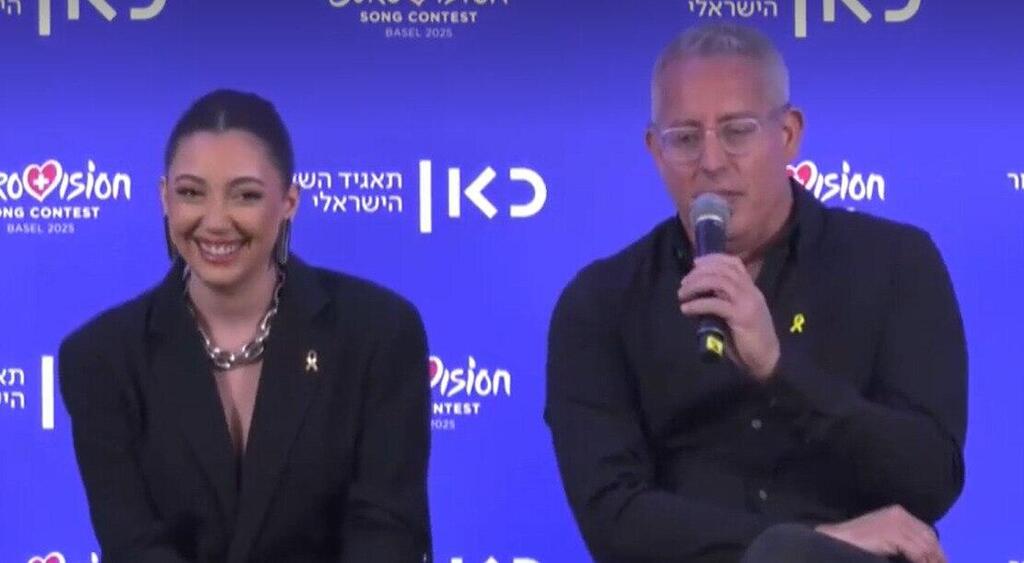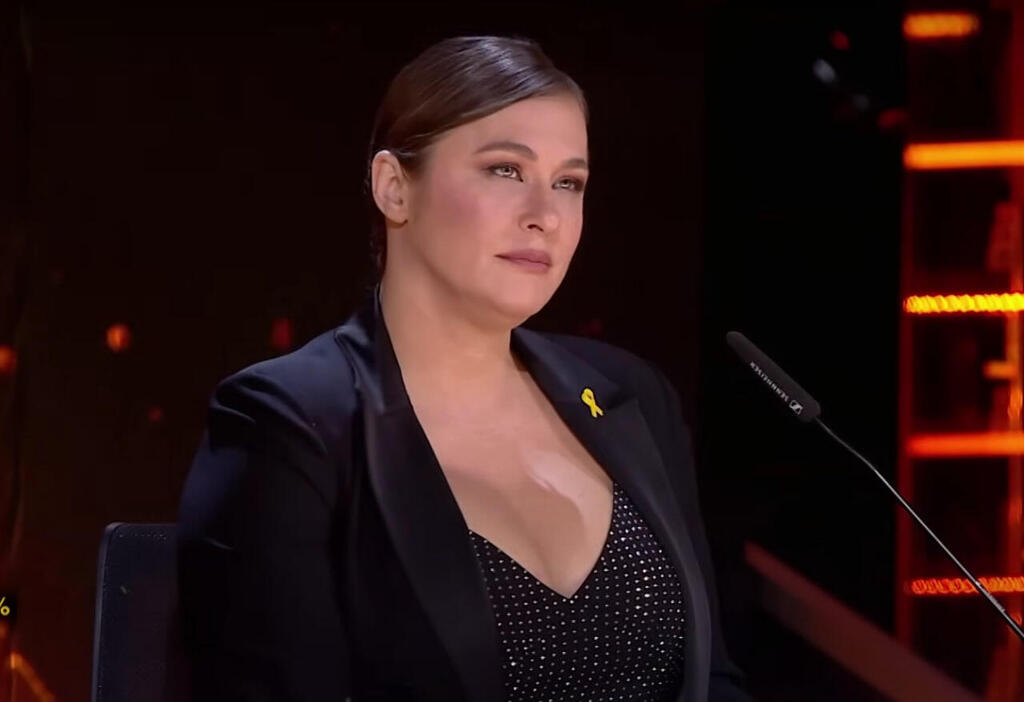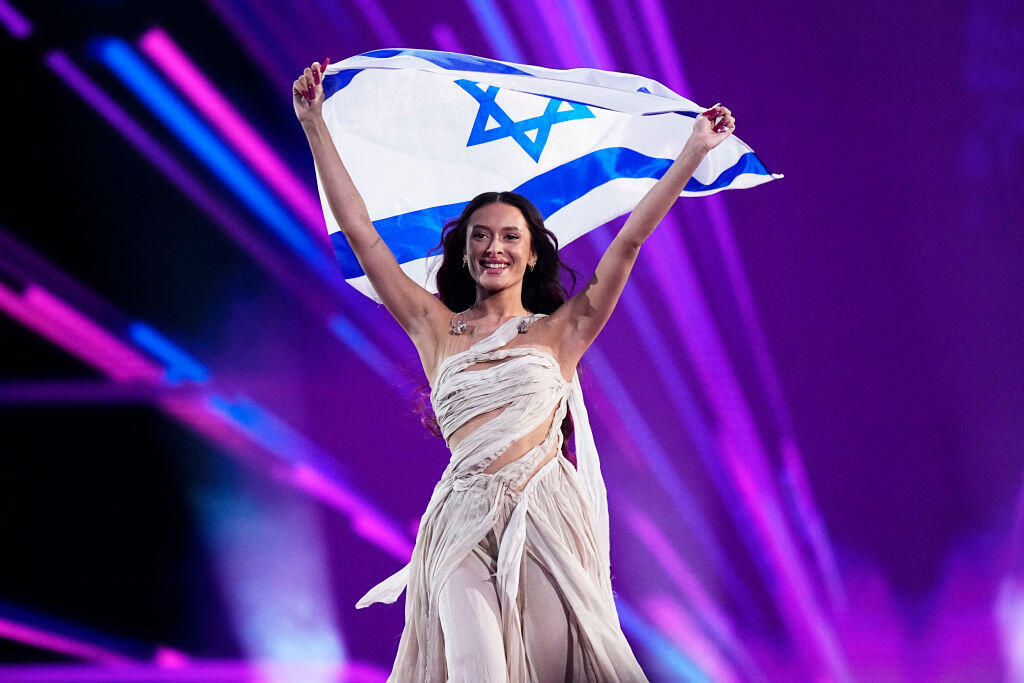Getting your Trinity Audio player ready...
This will not be Yuval Raphael’s first time in Switzerland. Her first visit was at age five, when her parents moved there for three years. The second, 18 years later, came just after she survived Hamas’ massacre at the Nova music festival. This time, she arrived with a mission—informal advocacy on Israel’s behalf in the midst of war.
This will not be Raphael’s first time in Switzerland, but this time, the weight on her shoulders is heavier than ever. A little over a year after her previous visit, she is returning once again with a mission—this time, a national one.
While millions of Israelis will be cheering her on, she will be representing them in the Eurovision Song Contest. Despite the painful memory of the jeers directed at Eden Golan last year and the hostility shown by some contestants—including the Swiss winner—Raphael does not see victory as an impossible dream. She firmly believes it is within reach, and she intends to do everything she can to achieve it.
“Yuval Raphael is focused and believes in herself in a way we haven’t seen in a long time—especially for someone so young and inexperienced,” say members of Israel’s Eurovision delegation. “It’s pretty remarkable. A 24-year-old who has endured such a severe trauma, who first stepped on a stage less than a year ago, and yet, despite everything happening around her, is convinced it can be done.”
Raphael’s confidence is not unfounded. Since Sunday, when her song New Day Will Rise—written and composed by singer-songwriter Keren Peles—was unveiled, Israel has jumped four spots in the betting odds, from seventh place to the top three. The song also reached one million views on the competition’s official YouTube channel within 72 hours—a rare achievement compared to other countries.
“This is the first time since Toy by Netta Barzilai that we’ve had such a strong opening after a song reveal,” says Yoav Tzafir, chief editor of The Next Star—Israel’s televised competition for selecting its Eurovision contestant—and lead director of Israel’s delegation.
'Her story is an inseparable part of who Yuval is'
Yuval Raphael’s path to becoming Israel’s representative at the Eurovision Song Contest began shortly after the devastating events of October 7. The Next Star producers discovered her on social media and reached out, inviting her to participate. But Raphael knew the timing wasn’t right—she was still reeling from the trauma she had endured while hiding in a field bomb shelter near Gaza.
The show’s psychologists confirmed what she already felt: it was too soon. “It was all so fresh,” said Tzafir. “There was no point. But we knew we’d try again the following year.”
Did you know from the start she would win?
“No. Sometimes I can tell early on, but this year we had incredibly strong contestants, many with heartbreaking stories.”
Raphael’s own story of survival is both harrowing and inspiring. She endured no fewer than 20 close encounters with Hamas terrorists who passed by the shelter where she was hiding. What was meant to be a night of music and celebration with friends at the Nova festival turned into a desperate struggle to stay alive. She lay motionless for eight hours, pretending to be dead, concealing herself among the bodies of those murdered by Hamas.
After surviving, Raphael made a decision: she would share her story whenever possible. In April, five months after the massacre, she testified before a Knesset committee. “I was surrounded by bodies everywhere. There was one specific body I hid beneath every time terrorists came. It was riddled with bullets, bleeding on me from every direction. I lifted her head, pressed her cheek against mine—that’s how I shielded myself.”
Of the roughly 50 people who sheltered with her in a small concrete enclosure between the communities of Re’im and Be’eri in southern Israel, only 11 survived. For Raphael, the road ahead became clear: advocacy and music. “These are the two things that strengthen me most right now,” she said.
To pursue both, she chose to confront her trauma head-on. “I asked for a checklist—what do I need to do to make sure I don’t stay stuck in this place? They told me, ‘Start talking about it.’ And through talking, I found healing.”
Speaking before the United Nations, she introduced herself with powerful simplicity: “My name is Yuval Raphael. I am a survivor of the October 7 massacre. I am not here to make political statements—I am here to open my heart.”
Raphael did just that—not only through advocacy but also through music. The Next Star, which marked her first experience performing on a professional stage, quickly became a platform where she won the hearts of both the judges and viewers at home.
“In the final, five out of our six judges gave her douze (twelve) points,” Tzafir said, referring to the maximum score in Eurovision-style voting.
Judges' panel member Moran Aharoni hinted that Raphael’s story played a significant role in her selection.
“Does anyone really think our judges would give such a score based only on a story? There’s a responsibility here—we’re sending Israel’s representative to Eurovision. Plus, the public at home had the final say, and I always trust the wisdom of the crowd. At the end of the day, her story is an inseparable part of who Yuval is.”
After achieving her dream—both advocating for Israel and earning the right to represent it at Eurovision—Raphael knew that hard work lay ahead. The most crucial decision was still before her: choosing the right song. As it does every year, Israel’s public broadcaster, Kan, opened a call for song submissions. More than 50 composers submitted entries, and after a selection process by a professional committee, three finalists emerged: Keren Peles, Eliad Nachum and Nitzan Kaikov.
Raphael quickly stepped into the recording studio to record all three songs, allowing the committee to determine which one suited her best. But just before the final vote, she made a personal request: “Choose Keren Peles’ song for me.”
The committee was under no obligation to honor Raphael’s request. At least one past case proved that the panel sometimes knows better than the artist. In 2018, Netta Barzilai had asked to compete with Bassa Sababa, a song she had written herself. The committee overruled her choice and selected Toy instead—the song that went on to win Eurovision.
“I remember Netta crying,” recalled Tzafir. “This time, we decided to take the artist’s request into account. More than that—when the panel heard Keren’s song in Yuval’s voice, they were in tears.”
Peles’ song ultimately received the highest score, followed by Nachum’s, with Kaikov’s in third place.
However, the selection process was not without controversy. A group of more than 20 composers objected to how the song was chosen, alleging a conflict of interest, considering Peles was a member of The Next Star's judges' panel. They even threatened to petition the Supreme Court. The crisis was ultimately resolved through negotiations initiated by Kan CEO Golan Yochpaz, with an agreement to review the selection process for future years.
“Yuval was thrilled with the choice,” members of Israel’s Eurovision delegation said. “She truly felt it was the song that suited her best.”
Together with producer Tomer Biran, Raphael refined the song and filmed a music video that, whether intentional or not, carries references to the Nova festival.
“The video follows Yuval as part of a group of friends heading out into nature,” explained video director Ofir Peretz. “Gradually, she becomes the one telling their story. At first, she sings to her friends. Then, she sings alone, until, at the climax of the video, a massive chandelier appears above her in the middle of the wilderness—symbolizing her journey from rock bottom to the Eurovision stage.”
Olympic-level security operation at Eurovision
There was intense anticipation leading up to the unveiling of Israel’s Eurovision entry, but after the song’s release, reactions in Europe were overwhelmingly positive. “Israel doesn’t make things easy for us,” said Eurovision blogger Henrik Larsson in a reaction video he posted online.
“I don’t need to say much—we know Yuval can sing, and this is a powerful song with a strong melody. I love the mix of languages and the way she performs it—bravo, Israel. This is a song that could make the top five. Israel is aiming for gold again. I don’t think they’ll win because people still have differing opinions about Israel, but they’ll go far. I can’t wait to hear it live. Yuval Raphael is stunning—this is how you do a ballad, this is quality.”
The numbers also speak for themselves, with the song gaining significant traction across Europe on platforms like YouTube and Spotify, outperforming many other Eurovision entries.
But despite the warm musical reception, Israel is preparing meticulously for the challenges that come with competing in the midst of war—both in terms of the competition itself and security concerns.
The Shin Bet security service is already working at a heightened level of readiness ahead of the delegation’s departure for Switzerland, given the high potential for terrorist attacks against Israeli and Jewish targets abroad.
6 View gallery


Shin Bet security detail (left) joins Israeli delegation in Sweden for last year's Eurovision edition
(Photo: Shin Bet)
As part of the security arrangements, a large team from the Shin Bet’s VIP and delegation protection unit will accompany the delegation, in coordination with Israeli intelligence agencies and local security forces. Sources told Ynet that advanced security technologies will be deployed to counter a wide range of threats, some of which have never been used before. The details of these security measures were approved for publication by Israel’s military censor.
Given the sensitive security situation abroad, particularly the sharp rise in antisemitism across Europe, the Shin Bet has increased security measures while strengthening cooperation with security agencies in host countries. According to Israeli officials, the security operation will be as complex as those carried out for last year’s Eurovision in Sweden and the upcoming Paris Olympics.
Beyond security, the Israeli delegation also expects challenges backstage, where stricter rules have been implemented compared to previous years.
<< Get the Ynetnews app on your smartphone: Google Play: https://bit.ly/4eJ37pE | Apple App Store: https://bit.ly/3ZL7iNv >>
For example, following an incident involving an Israeli team member last year, a new regulation bans the filming of other participants without their explicit consent. The rule was introduced after Israeli fashion designer Itay Bezaleli filmed the Greek contestant without her approval, leading to backlash.
The delegation is also aware that they will be prohibited from displaying anything the European Broadcasting Union (EBU) deems “political.” This includes wearing pins advocating for the release of Israeli hostages, which will not be allowed anywhere within the Eurovision venue—not even backstage, let alone on stage.
“No one wants to take any risks,” delegation members said. “We’re not here to provoke or to make statements. We’ll be polite to everyone.”
The Israeli team is also preparing Raphael for potential hostility similar to what last year’s representative, Eden Golan, faced—including audience boos, provocative interview questions and anti-Israel demonstrations.
“Yuval is mentally very strong,” delegation members said. “She is ready to work incredibly hard, listens carefully to advice and has an experienced Eurovision team supporting her. We are preparing for even tougher scenarios, though we prefer not to give people ideas. I’ll just say that last year, we even prepared for the possibility of someone storming the stage mid-performance. There are all kinds of strange and unexpected threats.”
Raphael will not be flying to Eurovision alone—her family members have already purchased tickets, and some of the survivors who sheltered with her during Hamas’ October 7 attack will also travel to Switzerland to support her. Kan has helped secure their access to the semi-finals and grand final.
“They’ve become like family. Their support will light the way for Yuval,” delegation members said. “They’re coming to embrace her and stand by her, but they’re also coming to advocate for Israel. These are very special people. While they’re not allowed to mention anything related to October 7, Yuval knows exactly why she’s singing—and, more importantly, who she’s singing for.”
Among those joining her is Adar Dohan, one of Raphael’s closest friends, who survived the Nova music festival attack with her. Speaking to Ynet, Dohan described the emotions surrounding the upcoming trip.
“We talked about this since she started The Next Star, and we said that if she won, we would be there,” she said. “This is such an emotional event. We went through the hardest experience of our lives together. We saw each other in the most painful and intimate moments a person can experience. We met on October 7, and we became family.”
Dohan also spoke about the role she and the other survivors hope to play. “We’re going to support her, to make sure she feels at home, surrounded by love and security—to show her that she’s larger than life. We’ll do everything to make her feel safe and protected. We’re so excited to be there. For her, this will be a moment of peace, and for us, it will be deeply moving. This is a full-circle moment—for all of us. From where we were to where we are now.”







